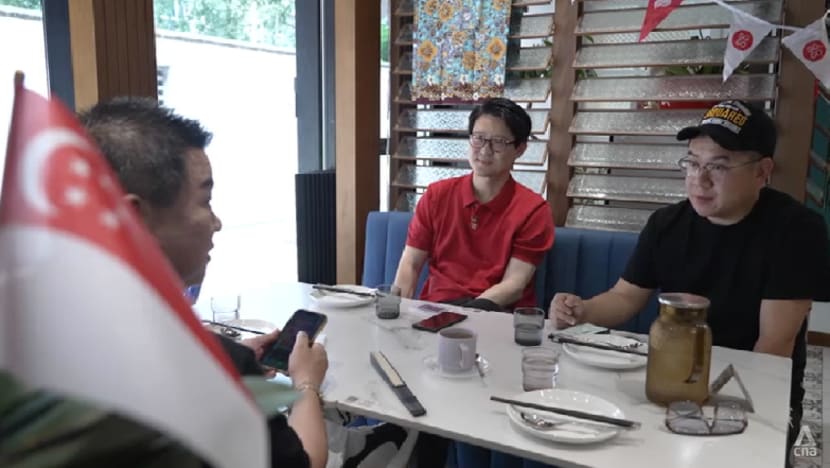Singaporeans living in China bond with locals over music and food
Singapore is marking 35 years of diplomatic ties with China this year.

Flags decorate Singaporean restaurant The Vanda in Beijing amid SG60 celebrations.

This audio is generated by an AI tool.
BEIJING: Billy Koh is a familiar name in the Singapore and Chinese music scenes.
He started his career in the 1980s with Singapore's Xinyao music movement, banding with a group of musicians to establish music company Ocean Butterflies.
The record label went on to groom homegrown talents like Kit Chan, A-Do and twin act BY2.
A major highlight of his career came in 2003 when he helped launch Singaporean mandopop star Lin Junjie, better known as JJ Lin. One of Singapore’s most successful music exports, Lin enjoys a large fan base in China.
Koh left Ocean Butterflies a decade ago when it was acquired by major Chinese music giant Taihe Music Group. He went on to set up Amusic Rights Management, an international music company based in China.
Ahead of Singapore’s National Day on Saturday (Aug 9), the veteran music producer said he is grateful to have made a name for himself and his home country.
Aside from celebrating its 60th year of independence, Singapore is marking 35 years of diplomatic ties with China this year. Koh said that the two nations can benefit from more engagements.
“I really treasure this relationship that Singapore and China have. I think people from both countries need to interact more and learn from each other more,” he added.
Today, Koh continues to mentor a new generation of artistes at his studio in the Chinese capital.
He told CNA he decided to relocate as Beijing is now the heart of the Chinese popular music scene.
“As the industry grew, we realised that we have to go for a bigger market, which was in Taipei in the 1990s. The industry kind of moved its centre to Beijing after the 2000s so I have to follow the industry,” he said.

Students at his music studio are mostly Chinese with a handful of other nationalities working alongside each other in hopes of breaking into the highly competitive Chinese music scene.
Among the artistes is Aldo Tan, one half of electronic urban-folk duo BZ1. The Singaporean singer said the pace is much faster in China but there are also more opportunities to shine.
“I have learned things that will probably take, like, 10 years to learn in Singapore on my own. Being here and the number of opportunities that (teacher Koh) gives me and BZ1 … I just feel super lucky to be here,” the 25-year-old said.
Koh added: “When you work in a new environment, you always stay competitive. You always keep learning, advance yourself and make sure you are useful to the rest.”
Aspiring Chinese singer Liu Xinyu, who is an apprentice of Koh's, said that besides learning music, being around Singaporeans helps improve her English.
"Actually, my English is not good, it's very poor. But sometimes teacher Koh and the rest communicate in English, so I look up the words they're saying and learn from them,” she told CNA in Mandarin.
FOOD, A UNIVERSAL LANGUAGE
Food is another factor bridging cultures and bringing people together.
Tucked away in the Jinshangyuan commercial building in Beijing is a restaurant with an unmistakable Singaporean touch.
The Vanda, which is decorated with colourful Nyonya batik, has also been decked out in flags and commemorative pins in recent weeks to celebrate Singapore’s birthday.
Patrons at the restaurant said they enjoy the fusion of Southeast Asian tastes in dishes that include chicken rice, laksa, hokkien mee and chilli crab.
“I found everyone to be really warm and friendly, which made me want to visit Singapore even more, to better understand its people and their culture,” said a diner.
Singaporean William Ding opened the eatery earlier this year, describing the venture as coming "a full circle".
“My grandfather (went) from China to Singapore and started his business, a coffee shop. Me, coming back, it's like the handing over of heritage,” said The Vanda’s co-founder and managing director.
This is the 53-year-old’s second restaurant in Beijing. He opened his first outlet in 2012 and credits his local Chinese partner with helping him navigate the business environment.
“He understands Singaporeans – how we talk and our culture. He helped me translate some of the cultural differences when I first came here. He’d explain to me why I should say this or not, and how it may be perceived,” he said.
“When we have the amount of trust that's built between a local like him and myself, we can actually overcome a lot of challenges together.”














